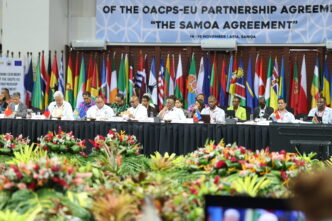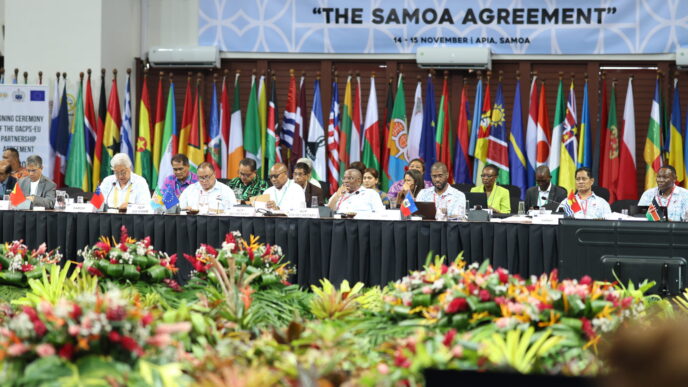Israeli attack levels Gaza school. Photo credit: France 24
The winds of an all-out regional war and a possible Third World War are right now blowing fiercely in the Middle East. Countries including Nigeria are evacuating their nationals from the region and those without means to do so are asking them to leave as quickly as feasible.
For about a year now Israel has been bombing the Palestinian Gaza strip to smithereens in retaliation for the killing of several Israelis revelling in an outdoor event inside Israel last October by members of the Palestinian Hamas group. In the attack, the Hamas operatives took with them scores of Israelis in addition to the killing
In response, the Israeli government led by Prime Minister Benjamin Netanyahu vowed to exact a severe retribution on Hamas by going after its infrastructure in the Gaza strip. In the process about 50,000 Palestinians have been killed in the non-stop combined bombing raids and ground attacks by the Israeli Defence Forces. The Israelis too have suffered thousands killed in pitch battles with the Hamas operatives.
Shunning calls across the world for a ceasefire and to allow humanitarian convoys to convey relief supplies get to the besieged Palestinians, Israel had carried on its relentless aerial bombing and ground attacks indiscriminately targeting hospitals, schools, worship places, residential areas, water and electricity plants and other critical infrastructure.
Advertisement
To the north of Israel in southern Lebanon, the Lebanese guerrilla group Hizbollah which supports Hamas had been launching intermittent attacks on targets in Israel while the latter has been engaged in Gaza. The Israeli army’s engagement against Hizbollah took a turn for the worst recently when its leader Hassan Nasrallah and several of the group’s leaders were killed in coordinated bomb blasts through their pagers using electronic timing devices to detonate hidden bombs placed in the pagers. Israel has followed up its aerial bombing of Lebanon with ground attacks intended to smash Hizbollah and its infrastructure in Lebanon.
In retaliation last week, Iran to which Hizbollah is affiliated, launched hundreds of missiles some of them hypersonic on targets including the strategic Nevatzim Airforce home to some of Israel’s cutting edge fighter airplanes and the headquarters of the Israeli foreign Intelligence out-fit MOSSAD in Herzliyya district (named after Theodor Herzl, the founder of the World Zionist movement). Iran said the attacks were carried out in response to the killing of the Hizbollah leader and his associated and vowed that should Israel launch any counter attack, Iran with greater force.
Israel has promised to respond to these missile attacks ‘’at a time of its choosing’’. Analysts looking at implication of this statement have zeroed in on some scenarios that the possible Israeli strike will take.
Advertisement
As there are no land borders between Israel and Iran the possibility of such an attack will most likely be launched by air. Israel could decide to respond in kind by missiles and Unarmed Air Vehicles (UAVs, also known as Drones) targeted at sensitive Iranian installations like air and army bases. It could also target refineries, arms production and headquarters of the Iranian defence and intelligence establishment, especially the elite Iranian Revolutionary Guards.
Israel could also send squadrons of its air force to bomb targets deep in Iran. For this, the Israeli air force may opt to use land air bases in Cyprus or Azerbaijan. Israel could also request the United States to allow it use its aircraft Carrier stationed nearby in the gulf. There is also the option of using the huge US base in nearby Qatar.
For Israel to exact retribution on Iran it must be commensurate or even more that what Iran did with its recent strike. And I believe in their preparations for such, Prime Minister Netanyahu and Defence Minister Yoav Gallant would not rule out the nuclear option.
For Israel all of these scenarios are fraught with heavy implications.
Advertisement
Using air bases in both Cyprus and Azerbaijan will certainly be balked at by Erdogan’s Turkey. Both countries are deep sore points for Turkey and using any or both of them to attack Iran will draw serious reservations among the Turkish population. This is in addition to the unmanageable blowbacks that will likely follow the use of such option. Using this option also will not afford the Israeli planes the needed surprise element as mid-air refuelling and air manoeuvres on the way to bombing Iran will be picked up by radars. And in the unlikely case of some of the planes evading detection and dropping their payloads, they may not return safely back. Although much has been made about the stealth and radar evading capabilities of the American made F-35 stealth fighter planes which are in the inventories of the Israeli air force, it will not be beyond the capabilities of the Russians, Turks and even the Iranians to detect the movement of those planes at some point. In planning an air invasion of Iran, the Israelis would certainly reflect on the incident in 1980 when American Delta Special Forces failed in their attempt to rescue American hostages held by the Iranians following the Iranian revolution. Some reports had it that it was the Soviets who tampered with the communications of the American Special Forces which in turn resulted in the helicopters carry the forces clashing against each other.
In the present scenario it will not be out of place to expect the Russians, Turks and Iranians who have assets in the vicinity to track the movement of Israeli planes towards Iran and proceed to thwart their mission.
Sending using agents in Iran to plant and detonate bombs in selected Iranian targets is something the Israelis have done before. But the commensurate damage in this regard would not match the scale of what Iran did to Israel. And the danger involved in such operations in terms of likely capture of the agents and malfunctioning of the devices could result in terrible consequences for Israel.
Israel could also consider using nuclear bombs on Iran. But that will be suicidal. First the radiation effects could drift far beyond Iran and spread throughout the region endangering the population of other countries. Secondly if Israel does not have first strike nuclear capability to knockout Iran’s counter strike abilities then it will be a worthless effort. In such a scenario, Israel will be a target not only the Iranians but other countries in the region as well.
Advertisement
Let us face the reality; between Israel and Iran there is a state of mutually assured destruction. A war between both countries under the present circumstances would not be limited to them but would drag in other significant parties as well. Meir Dagan the former Chief of the Israel’s MOSSAD cautions that Israel should not contemplate going into a war with Iran alone. He wants the US and its allies to help Israel do the job. But Iran has warned that any US involvement would result in its assets in the region being legitimate targets for Iranian attacks. That means the huge US base in Qatar and others in Saudi Arabia will come under attack from Iran. And there is a distinct possibility that the oil infrastructure in Saudi Arabia, Kuwait and other gulf states will be affected. Iran could also shut down the strategic straits of Hormuz through which about a third of global oil shipping passes through. All these will lead to an immediate spike in global oil prices resulting in serious negative consequences for the world economy.
Is there a way out of this looming quagmire?
Advertisement
My take is that Saudi Arabia and other gulf states who stand in the line of fire will try to persuade Russia, China the US and other parties to prevail on Iran to allow Israel as a face saving measure ‘’avenge’’ the strike on it by Iran in a certain way agreed by all the parties. As arranged, Iran will refrain from retaliation. And then there will be strident calls for restraint and de-escalation. And there will be secret negotiations between Iran and Israel brokered by Russian, US, China and Saudi Arabia. All issues like the Palestinian question, the Iran nuclear plans, guarantees of Israel’s security in the region and security of oil infrastructure will be on the table.
Similar diplomatic conclave has happened before during the 1973 war between Egypt and Syria on the one hand and Israel on the other. That war went to the brink of nuclear war as the Arab forces came to within a sight of defeating Israel with only option left was to use nuclear weapons on Egypt. A deal was done whereby the US provided satellite images of the Egyptian army formations in the Sinai to the Israeli army to through a gap and surround the Egyptian army. This strategic manoeuvre resulted in a ceasefire and for secret negotiations to commence between Egypt and Israel leading to the historic Camp David Accords in 1977.
Advertisement
The Iranians too are not new to this type of diplomatic manoeuvres. The hostilities that had existed between Iran and the US following the Iranian revolution did not deter both from negotiating secretly on the Iran-Contra deal.
In the present circumstances where the world is on the brink nobody would want a regional war in the Middle East as a trigger. Where the only alternative left is the devil’s alternative of a nuclear war, all the major parties involved certainly find a way to prevent it in view of the consequences.
Advertisement
Views expressed by contributors are strictly personal and not of TheCable.
Add a comment










